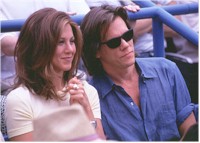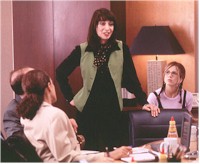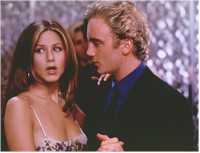|
| |
Picture Perfect
Review by Carrie
Gorringe
Posted 1 August 1997
 |
|
Directed by Glenn Gordon Caron
Starring Jennifer Aniston, Jay Mohr,
Kevin Bacon, Olympia Dukakis,
Illeana Douglas, and Kevin Dunn
Screenplay by Arleen Sorkin, Paul
Slanksy
and Glenn Gordon Caron |
As is usual in romantic comedies,
our heroine, Kate, (Aniston), is caught between the proverbial rock and a hard place. She
has great ideas – indeed, it is she who comes up with the ad campaign that will,
shall we say, cut the Gulden’s mustard and save the Mercer Advertising Agency –
and ambition to burn. Unfortunately, she also has the ticking biological clock which
sounds like Big Ben from ten feet away, and a hyper-yenta of a mother (Dukakis) who
mistakes the ticking for the sound of an impending bomb blast, one that will take with it
all of her dreams of grandprogeny. Her ambitions are thwarted by the company’s
namesake, Mr. Mercer (Dunn), who disdains the idea of putting someone in charge of a
campaign who dresses like she’s barely "out of college."
 A trip to Henri
Bendel takes care of that sartorial problem, but then she still has that little attraction
to Sam (Bacon), the office bad boy who won’t date her because she’s too nice. On
a brief trip to a friend’s wedding, she encounters Nick (Mohr), a videographer as
earnest and sweet as the type of man some women claim to want; he’s what your mother
used to call "a good provider," but Kate isn’t really interested. Despite
her best intentions, some pictures of Nick and Kate at the wedding get back to and around
the office, courtesy of Kate’s well-meaning friend, Darcy (Douglas). Soon Kate finds
herself "engaged" to Nick in an attempt to please her paterfamilias employer.
Moreover, Nick has provided further proof of his shining personality by saving a child
from a fire. Naturally, everyone wants to meet Nick, and a company dinner is planned. For
once in Kate’s life, however, her timing couldn’t have been worse; proving that
she possesses her own biases against "niceness," she decides to push her luck
and get Sam to have an affair with her, which he is all too happy to do, once he believes
that she is engaged and he is in no danger of having her salivate over china patterns in
his presence. Desperate, she contacts Nick and offers him one thousand dollars to act as
her faux finance for one evening. There is one more little problem, however: Nick seems to
be taking things a little too seriously, as does Sam, and suddenly too many rocks start
hitting too many of Kate’s more vulnerable places. A trip to Henri
Bendel takes care of that sartorial problem, but then she still has that little attraction
to Sam (Bacon), the office bad boy who won’t date her because she’s too nice. On
a brief trip to a friend’s wedding, she encounters Nick (Mohr), a videographer as
earnest and sweet as the type of man some women claim to want; he’s what your mother
used to call "a good provider," but Kate isn’t really interested. Despite
her best intentions, some pictures of Nick and Kate at the wedding get back to and around
the office, courtesy of Kate’s well-meaning friend, Darcy (Douglas). Soon Kate finds
herself "engaged" to Nick in an attempt to please her paterfamilias employer.
Moreover, Nick has provided further proof of his shining personality by saving a child
from a fire. Naturally, everyone wants to meet Nick, and a company dinner is planned. For
once in Kate’s life, however, her timing couldn’t have been worse; proving that
she possesses her own biases against "niceness," she decides to push her luck
and get Sam to have an affair with her, which he is all too happy to do, once he believes
that she is engaged and he is in no danger of having her salivate over china patterns in
his presence. Desperate, she contacts Nick and offers him one thousand dollars to act as
her faux finance for one evening. There is one more little problem, however: Nick seems to
be taking things a little too seriously, as does Sam, and suddenly too many rocks start
hitting too many of Kate’s more vulnerable places.
Picture Perfect is a lower-key version of My Best
Friend’s Wedding, but, in many ways, the reduction in star wattage does not
reduce its charm. In fact, Picture Perfect is a paradox; the narrative’s
lockstep adherence to the traditional romantic-comedy formula as outlined above (a woman
in crisis must eventually decide to be true to her principles, after she figures out just
what exactly they happen to be) actually renders it a better film than the Julia Roberts
extravaganza (although it is still a fine resurrection of the screwball comedy). Picture
Perfect may not have drastic mood swings, blatantly beyond-the-pale behavior and
madcap cross-country races; however, what it does have is the ultimate paradox: all of the
key characters are involved in doing their individual interpretation of the slow burn. The fever is in their
minds and, with one exception (still rather subdued, given the situation), not in their
actions. The audience cannot simply react to Capraesque physicality, because the action
here lies in the subtle gestures and the coolly droll dialogue. Granted, this is a more
labor-intensive process than merely watching people racing for the airport and the church,
but Picture Perfect has at its core a fairly flattering presumption: it assumes
that audience members enjoy the process of getting there as much as the arrival. They can,
when the film gives them something to keep them occupied, and Picture Perfect does
not disappoint. The fever is in their
minds and, with one exception (still rather subdued, given the situation), not in their
actions. The audience cannot simply react to Capraesque physicality, because the action
here lies in the subtle gestures and the coolly droll dialogue. Granted, this is a more
labor-intensive process than merely watching people racing for the airport and the church,
but Picture Perfect has at its core a fairly flattering presumption: it assumes
that audience members enjoy the process of getting there as much as the arrival. They can,
when the film gives them something to keep them occupied, and Picture Perfect does
not disappoint.
Moreover, the screenwriters and director have come to yet another presumption, one
which seemed to have gone the way of the dodo bird: people actually enjoy listening to
elegantly witty banter. Supposedly, this should be hardly surprising, since co-writer and
director Caron was the creative force behind Moonlighting, the ‘80s television
show that gave new meaning to the concept of coitus postponus. The
will-they-won’t-they dilemma was augmented by sharp ripostes dashed off with a
seemingly indifferent air; Kaufmann and Hart it wasn’t, but Moonlighting did
represent a glimmer of intelligent sexual communication in the television and social
wasteland of the 1980s.  Picture Perfect aspires to that same simple, but no less entertaining,
level. There are, for example, subtle jabs at marriage-happy couples who only represent
the premise that misery loves company; at the end of what was supposed to be the company
dinner, replete with platitudes about the importance of marriage (all from people who are
on their third trip round) – Darcy excuses herself with an offhanded remark about an
appointment with the marriage counselor the next day. It takes a second or two for the
significance of the comment to sink in, so matter-of-factly has it been delivered; then
the satisfied chuckling commences. The line may be redundant, but the audience has been
waiting for someone to puncture, regardless of how inadvertently, the balloons of the
sanctimonious individuals who have been giving Kate such a hard time. Perhaps this is not
comedy at its zenith, but it comes close enough to pass. Picture Perfect aspires to that same simple, but no less entertaining,
level. There are, for example, subtle jabs at marriage-happy couples who only represent
the premise that misery loves company; at the end of what was supposed to be the company
dinner, replete with platitudes about the importance of marriage (all from people who are
on their third trip round) – Darcy excuses herself with an offhanded remark about an
appointment with the marriage counselor the next day. It takes a second or two for the
significance of the comment to sink in, so matter-of-factly has it been delivered; then
the satisfied chuckling commences. The line may be redundant, but the audience has been
waiting for someone to puncture, regardless of how inadvertently, the balloons of the
sanctimonious individuals who have been giving Kate such a hard time. Perhaps this is not
comedy at its zenith, but it comes close enough to pass.
And a wonderful cast infuses the dialogue with enough spirit to get past the necessary
core of predictability. Aniston, in particular, shows an immaculate sense of timing that
even her role as Rachel in Friends has never adequately showcased. Her moves are in
sync with the film’s myriad requirements. She is all appealing daffiness infused by
nervous energy in one moment, then the picture of screwball sophistication the next. Mohr
(last seen in Jerry Maguire) acts as a flawless foil
to Aniston’s antics, as is Douglas. Only Dukakis, with her hectoring mannerisms and
tone, becomes somewhat of a damper on the goings-on; her character falls too deeply into
cliché to be completely credible. Otherwise, Picture Perfect keeps its goal of
entertainment in nearly perfect focus.
Contents | Features
| Reviews | Books | Archives | Store
Copyright © 1999 by Nitrate Productions, Inc. All Rights
Reserved.
| |
|